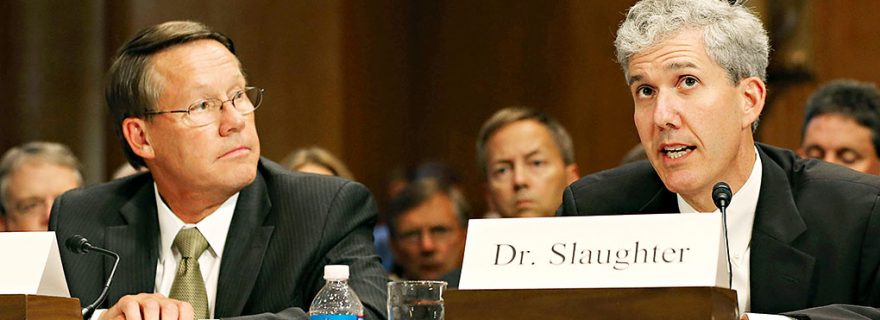It's highly unlikely that the average American consumer had heard of a company called
Shuanghui International until the middle of this year – but they certainly will over the next few years. The Hong Kong-based but mainly China mainland-owned company is a producer of meat products that only got going 30 years ago. As for its Shuanghui brand (Shineway in English), it was launched barely 20 years ago.
But in September, Shuanghui pulled off the biggest-yet takeover of an American company by a Chinese one when US regulators approved its $4.72bn acquisition of Smithfield Foods, a global conglomerate. Shuanghui, led by Managing Director Zhijun Yang, who worked his way up from the shop floor, had to fight for the deal. The notably defensive committee on foreign investment (CFIUS) signed off on the takeover only after senior representatives of both parties in Congress took a long and hard look at it under what they described as a “thorough review” of the deal.
$221bn
$2.3trn
Big deals Stateside
Significant as they are, China-inspired deals do not top the charts for 2013. Indeed, they pale in size when compared with those taking place in the US. With interest rates at historically low levels because the US Federal Reserve has pumped so much money into the economy, acquisition-hungry American companies could not resist the temptation of low single-digit loans to fund raids on rivals or complementary businesses.
Until Verizon's mammoth deal, it seemed that the top three would be the $28bn takeover of food group HJ Heinz by Warren Buffett's Berkshire Hathaway and 3G Capital, followed by Michael Dell's buy-back of his computer manufacturing company for $25bn and the $23.3bn acquisition of Virgin Media by Liberty Global.
But as people live longer around the globe, it was the rush for healthcare and life-science companies that dominated the top 10. In fourth place was Life Technologies after it was snapped up for $13.6bn by New York exchange-listed Thermo Fisher Scientific. Other top 10 healthcare deals in the sector include Onyx Pharmaceuticals (bought for $10.4bn by Angen), Bausch + Lomb ($8.7bn by Valiant Pharmaceuticals International), and Ireland's biotech group Elan ($8.6bn by Perrigo).
The number of global deals may have fallen by around 10 percent to 25,374 compared with 2012, but nearly all of these are below the radar, well under the $100m mark by value. It is however the size of the transactions that is instilling a growing confidence in most markets as well as China.
Rush to debt
For the first time in a long time, investors are rushing to back big-ticket debt splurges
According to underwriter Morgan Stanley's Paul Spivack, Global Head of Investment Grade Syndication, the level of interest was a shock. “We had orders in this book that exceeded anything we've seen before”, he told the Wall Street Journal.
After years of investor nervousness about mega-transactions, the ease with which Verizon's gargantuan acquisition was funded suggests the debt markets are regaining confidence and everybody is winning as a result. First, Verizon gets cheaper and more predictable debt than it otherwise would through loans organised by a syndicate of banks. Second, investors book a higher-yielding return from the corporate bonds than they would from, say, buying US Treasury bills.
And finally, the dealmakers – the Wall Street firms that oiled the acquisition – booked a total of $265m in fees. According to public filings, Barclays, Morgan Stanley, Morgan Chase and Bank of America took around $41m each for leading the debt sale.
More transactions, more regulation
In fact, some regulators are trampling all over transactions on the skimpiest of authority. The UK's competition authorities are a case in point. When Netherlands-based specialty chemicals group Akzo Nobel tried to buy all of Metlac, an Italian competitor, in July, the Competition Commission jumped in boots and all. Even though both companies were based outside Britain, it blocked the merger on the grounds that the companies make sales in the UK. Of nine competition authorities that could have intervened, the UK regulator was the only one to take such a step.
As lawyer Vera Rechsteiner of Houston-based law firm Andrews Kurth explained in a November note to clients: “[In the US] A transaction may be [deemed] ‘cross-border' for any number of reasons, including foreign deal participants, non-US assets or the application of non-US laws, to name a few.”
Raking the ashes
New insolvency laws in Germany have made it easier for opportunistic funds to jump into the fray and acquire assets on the cheap. Alarmed at the way some insolvency specialists were plundering assets through sky-high fees at the expense of creditors, Bonn passed a law in early 2012 that among other things gave creditors more say in post-collapse proceedings. Any important creditor can be elected to the creditors' committee, including third parties such as vulture funds that are often highly adept at rescuing a company in trouble, albeit at a price.



